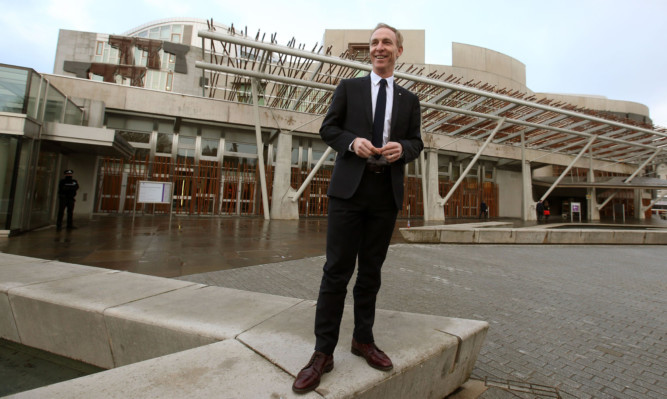
It is ultimately ideas rather than lists of powers that fire the imagination of voters.
So last week’s hoo-ha about more powers for Holyrood will have left many ordinary voters cold as we took what was another baby procedural step towards the ideas stage.
For it is what the parties plan to do with the new controls and, crucially, how they will spend the new revenue streams that most people care about.
Curiously, this makes the 2016 Holyrood election manifestos arguably more important than the party propaganda that is about to start dropping through your letterbox for May’s General Election.
Unsurprisingly, the SNP don’t think the powers unveiled by the UK Government, which look suspiciously like the ones the Nationalists signed up to at the Smith Commission, go far enough.
But Scotland going into the next decade is likely to look a very different place, and that is before the possibility of the SNP securing yet more devolution in any post-General Election power-sharing deal.
In less than three years’ time Scots families could be enjoying cheaper flights because of lower air passenger duty rates, paying lower income tax rates and receiving more generous welfare payments under the changes coming down the line.
A lot of ifs there, but these are the sorts of ideas which we will see fleshed out before 2016 and the extra powers for the Scottish Parliament are enshrined in law.
Jim Murphy yesterday got the ball rolling by announcing a Scottish Labour Government would use the new powers to stop onshore fracking.
The party’s Scottish leader claimed the environmental and safety case for fracking had not been made and unveiled plans to halt any of the drilling for gas in Scotland until the lessons from ongoing projects in the rest of the UK were learned.
The ban looks to be a temporary one as they say they would also hold a local referendum before final planning approval is given to projects.
Mr Murphy said: “With the new powers coming to Scotland through the Smith Agreement, all decisions about fracking will soon be made here. The UK Government should suspend the current licensing round for fracking until the powers have been devolved.
“People are concerned about shale gas. They are worried that it will be imposed on their community against their will and without their consent. I will not let that happen.”
Labour has also announced it would take Scotland’s railways out of private hands by the end of the decade. If elected into office in 2016, the party would invoke a five-year break clause in the ScotRail contract with Dutch passenger transport group Abellio which starts in April.
Then the railways would be open to bids from what the party describes as a non-profit bid involving passengers and local communities. However, this is already allowed under the current rules whereas the Smith Commission changes relate to allowing state-backed bids for the rail franchise. This means the party is likely to have to involve the Scottish Government or its agencies in the creation of a not-for-profit rail operator.
The incentive is there, claims Mr Murphy as the current operator of the ScotRail franchise has banked nearly £100 million in profits since 2008.
He added: “The best deal for Scotland is a People’s ScotRail, a railway company whose commitment is not to a group of shareholders or a foreign Government, but to the people of Scotland.”
In arguably the most important area of further devolution, tax, there is the possibility of cuts.
Tory leader Ruth Davidson claims it is a myth that most Scots want to see the new powers pledged to Holyrood used to raise taxes to fund welfare. She has instead made clear she will use the new devolution settlement to cut income tax, though details on how this will be paid for remain sketchy at this stage.
But the more powers plan unveiled last week is far from without its flaws. Away from the “veto” powers over some aspects of welfare retained by the UK Government, much work still needs to be done on the detail of issues, such as the crackdown on fixed-odds betting machines, which can cost punters up to £100 per spin.
Both Labour and the SNP have said they will use the new powers to crack down on the machines, but Nationalist MSP and long-time campaigner on the issue, Stuart McMillan, said as they stand they do not allow the Scottish Parliament to get to the root of the problem.
He said: “The plans could simply see a proliferation of different premises rather than a proliferation of the machines. A limited approach to devolution in this area simply will not work.
“To truly tackle this problem, the Scottish Parliament needs power to legislate not just on the number of machines but on controlling limits on stakes, density of machines in any given geographical area and on rapidity of play.
“The rules should also apply to other establishments such as casinos, not just betting shops.”
The Scottish Government isn’t happy with the wriggle room in the wording of the draft clauses published last week, which could see it forced to take on more debt to fund capital projects.
Also, loaded statements such as Scotland will be expected to “contribute proportionally to fiscal consolidation at the pace set out by the UK Government” that is, austerity are also likely to provide future flash points.
There is still a lot of “process” to go through on powers for Holyrood, but the first set of ideas are out there, from cutting taxes to reorganising the railways, and they auger well for the public eventually engaging with the so-called devolution revolution.

Enjoy the convenience of having The Sunday Post delivered as a digital ePaper straight to your smartphone, tablet or computer.
Subscribe for only £5.49 a month and enjoy all the benefits of the printed paper as a digital replica.
Subscribe